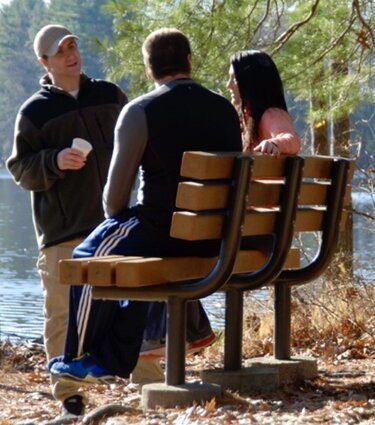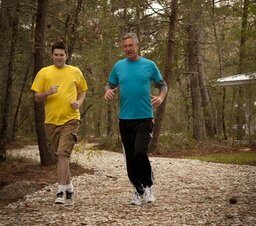WestBridge and the array of services it provides continues to grow. Its evidence-based treatment model has helped men heal from mental illness and substance use since 2001. Early next year, WestBridge will broaden its scope to include all genders. Hannaford has supported this nonprofit through the Community Bag and Bloomin’ 4 Good programs.
Tell us about WestBridge.
WestBridge compassionately provides mental health and substance use treatment to individuals and their families. We incorporate evidence-based practices to promote resiliency and lifelong recovery.
The organization was founded in 2001. It began when two parents were searching for effective treatment for their son with co-occurring mental health and substance use disorders. He had been through several programs yet wasn’t able to sustain recovery. They went to a National Alliance on Mental Illness conference and met a psychiatrist and researcher with significant expertise in this area of co-occurring disorders, Robert Drake, MD, PhD. The idea for WestBridge was born at that time. Their son was one of our first participants, and we have helped numerous men since then.
We incorporate evidence-based practices to promote resiliency and lifelong recovery.
What services do you supply to the community?
We offer services to men in a 12-bed residential treatment program, which is staffed 24-7, as well as provide community-based outpatient services. As of January 2023, we will also be offering an Intensive Outpatient Program (IOP) for all genders. All services are in Manchester, NH. Our programs are based on using multiple, simultaneous evidence-based practices that are demonstrated to be effective.
Our residential program is a Modified Therapeutic Community which offers group and individual therapy, psychiatry, Family Education and Support, vocational support and therapeutic and recreational community activities.

Our community-based outpatient program offers psychiatry, nursing support, care management, individual therapy, group therapy, mentoring, Family Education and Support and vocational support. Vocational support may include behind-the-scenes or side-by-side support for men either on a college campus, in the workplace, in a volunteer job or some combination.
Families are integrated into both programs and offered additional supports through our Family Recovery Resources program, which includes parent and sibling peer supports, parent and sibling support groups and a family portal.
We also offer Extension of Services which can be accessed by men who have completed either the residential or community-based outpatient programs in order to continue to provide certain services based on individual needs. These services may include psychiatry, individual therapy, case management, vocational coaching, recovery/wellness coaching and support or family coaching.
WestBridge also has alumni services for men who have completed our residential and community-based program. They’re able to connect with other alumni in recovery-oriented activities, such as museum trips, frisbee and skiing, and experience that recovery is fun.
For 20 years, we specifically served men with co-occurring disorders only, meaning symptoms of both mental illness and substance use. This year we expanded our focus to help men with mental health-specific treatment needs. And next year, we will be opening an IOP for people of all genders. Overall, we have a variety of services that are growing.

What sets your organization apart from others in your community?
We have expertise in treating men with thought and mood disorders, such as schizophrenia and schizoaffective disorder, bipolar disorder, depression and anxiety disorders and post-traumatic stress disorder. We treat men from all over the country because we specialize and offer longer-term treatment.
There are few private long-term treatment programs like ours, particularly in New Hampshire. And we’re using multiple simultaneous evidence-based practices that have been proven to work. These are things that make us unique.
Tell us a story that illustrates your organization’s good work.
There was a participant utilizing our vocational support services. He came to us with a psychotic disorder, believing he was being spied on, which was making his everyday life difficult. Once he stabilized in our program, he was able to get a retail job with the help of our vocational specialist. And from that, he discovered that he was a good salesman. He completed college with a degree in technology, all while staying in our program. We then helped him to get an internship, and he wound up in a career as a full-time technology sales representative, where he has won a number of awards.
This story illustrates that people with serious mental illnesses can recover with specific types of support. A lot of the stigma around mental health comes from the general public not being aware that people can succeed, overcome and thrive with some care and support. Individuals with serious mental illnesses can hold professional positions, and people who need side-by-side support can be successful in a job. We support and serve people with a range of needs.
It is essential to know that recovery is a lifelong process that requires support at varying intensity levels. With any illness, it is how you manage your symptoms that matters. The programs at WestBridge provide quality support to individuals and families so that they can succeed.
What is your most outstanding achievement or contribution to the community?
We’ve published a treatment outcomes study for men with co-occurring disorders in an international professional journal.
The study found that if men were with us for a year or more and participated in our residential and community-based outpatient programs, they had a significant chance of being in recovery across multiple domains at a two-and-a-half-year follow-up. It’s exciting that we have the study because this type of data for a treatment program is rare.
There was so much shame and stigma around mental health and substance use for a long time. While there is still much education to be done globally, I think they are both more accepted to talk about, which is great because people can have the support to enter treatment, get into recovery and stay in recovery. The published study is quite an achievement in advancing factual information about mental health and substance use disorders, and how people can and do recover.

What do you want people to know about WestBridge?
WestBridge was founded by a family, and the involvement of our participants’ families is at the heart of our treatment. This is why we offer support groups for parents and siblings who have a loved one at WestBridge. We take a side-by-side approach to engaging people in treatment, acknowledging that participants and families are the experts in their own lives. No one has all the answers, but collectively we can make a real impact.
WestBridge was founded by a family, and the involvement of our participants’ families is at the heart of our treatment.
How will you use the funds raised from the Hannaford Helps Community Bag and Bloomin’ 4 Good Programs?
Connecting with the Hannaford Bloomin’ 4 Good and Community Bag Programs is exciting, and it is moving for our staff to know that Hannaford wanted to partner with us. It is truly uplifting for our team that people are noticing the important and meaningful work we’re doing.
All the fundraising efforts support the WestBridge Recovery Opportunity Fund, which provides needs-based aid to participants and families with limited financial resources, helping them to continue to access our evidence-based treatment.
Recovery is a long-term journey for our participants and their family members. One of the challenges is that most private insurance companies don’t provide long-term treatment, meaning care can be interrupted. The funds earned in the Hannaford Bloomin’ 4 Good and Community Bag Programs help bridge that gap and make a meaningful difference in the lives of individuals and families experiencing mental illness, with or without substance use.
Is there anything you would like to add?
WestBridge is thrilled to be able to treat veterans in our residential program and give back to people who have served our country. It’s also a joy to see participants, staff and families work together to support mutual treatment goals. If anybody has questions about our treatment, contact our admissions team at 1-877-461-7711 or inquiry@westbridge.org. I am happy to be contacted as well via the above. You can also visit our website at https://www.westbridge.org/.

Published December 19, 2022.
